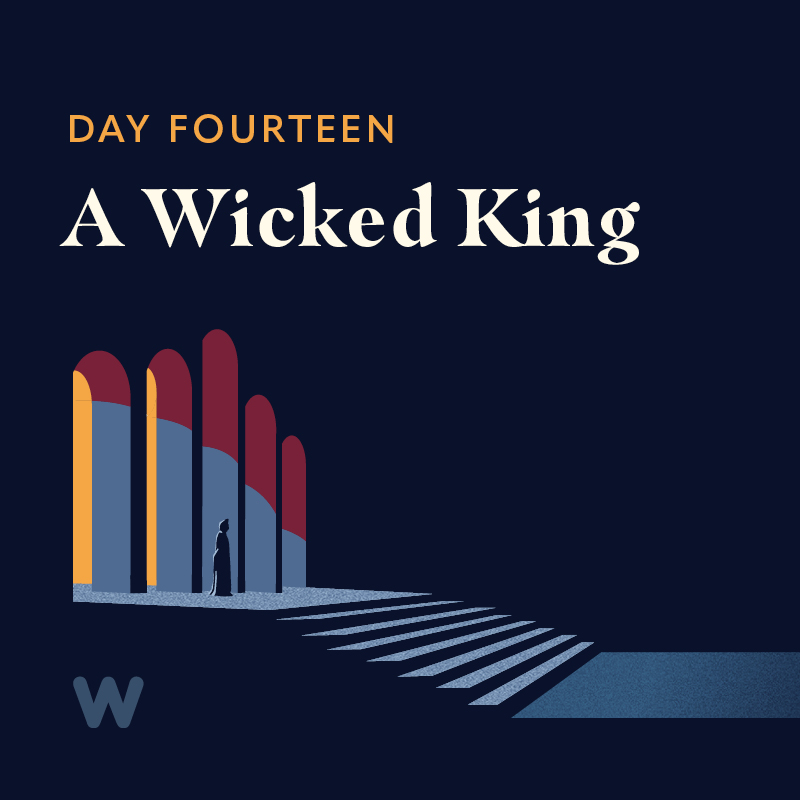Advent: Born to Dwell With Bible Study Fellowshipنموونە


Herod the Great
Verse 3 depicts starkly different responses to Jesus Christ’s coming as King. Matthew tells how news of the Magi’s eagerness to seek and worship the newborn King greatly disturbs King Herod.
The New Testament refers to several men as “Herod.” This Herod, involved in events surrounding Christ’s Incarnation, is Herod the Great. He was also called the “Idumean” (which means Edomite, the descendants of Esau). His father, Antipater, was an Edomite who had converted to Judaism. Because Herod the Great was not from the line of David, most Jews rejected him as a legitimate king.
Although Herod the Great knew the Scriptures and rebuilt the temple, the Jewish people hated him and his rule. He was an insecure and unstable political leader. He was known for insane jealousy and excessive cruelty. An untrustworthy man who trusted no one, he killed his best-loved wife out of jealousy and executed two of his sons.
While on his deathbed, King Herod imprisoned 70 Judean elders in the Hippodrome in Jericho. He ordered them to be executed upon his death to ensure that Judea was mourning his death. Instead, when Herod died, his sister released the men, and Jerusalem rejoiced.
Herod’s Experts
In verses four to six, Matthew reports King Herod’s reaction. Rattled by the Magi’s question, Herod consults the Jewish religious leaders regarding the Messiah’s prophesied birthplace. The chief priests and teachers of the Law were experts on the Scriptures (what we think of as the Old Testament).
These Jewish scholars knew the Messiah was coming and knew His prophesied birthplace. So, they quickly and correctly answer Herod’s question. The Messiah is to be born in Bethlehem in Judea. They recite portions of prophecy originally given by Micah: “But you, Bethlehem, in the land of Judah, are by no means least among the rulers of Judah; for out of you will come a ruler who will shepherd my people Israel.” This shepherd King could only come from the line of David; it could never be Herod.
Herod’s Deception
Matthew exposes Herod’s character in verses seven to eight. King Herod secretly calls the Magi before him. He inquires about the exact time of the star’s appearance. Then Herod sends them to Bethlehem to search for the child.
In an outright lie, Herod asks the wise men to report back to him so he may also go and worship the King. Nothing could have been further from the truth about his evil intent. Herod’s attitude and actions reflect utter rebellion against God and His Son. He resorts to lies and ultimately murder in an attempt to overthrow God’s preordained plan. (1)
Judea’s king and Israel’s religious leaders refused to recognize that the King of Glory had come to dwell with His people. These religious people were close by and should have been looking for Him. They had memorized the prophecies but failed to seek the Messiah. But God’s sign in the heavens summoned worshipers from a distant land. They followed God’s light to grow in knowledge through encountering Christ. Which of these two opposing responses do you connect with in your life to date?
Questions
- List the people in verses 2:1-8 and their responses to the news of Christ’s birth. How do you see similar groups and responses in our world today?
- Read Matthew 2:16-17. What possibly motivated Herod’s hostility against Jesus, and what do his character and actions warn us against?
- God is never evil nor causes people to sin. What do you wish King Herod “and all Jerusalem with him” had known at this point? What do you know with certainty today about Jesus the Savior?
Related verses:
- God’s purposes stand: Ps 33:10-11; Prov 21:30
Scripture
About this Plan

What does Christmas mean to you? Spend 20 days recounting the Bible's Christmas story from Old Testament passages and the Gospels. Slow down, worship Jesus, and cherish Him by faith. Receive and rejoice in God's greatest gift. Jesus Christ is the Word made flesh to dwell among us. All who believe may be re-born to dwell with God now and forever.
More
پلانە پەیوەستەکان

Worship With CXMMXNS: A 3-Day Devotional

Testimony and Tolerance

Cover Him Prayers: Intentional Prayers for Your Husband

Kids Bible Experience | It's Just Not Fair

Move With Compassion: A 7-Day Advent Devotional

Christmas Viewpoint

Acts 5:1-11 | Hypocrisy

Melodies of Hope: The Scriptural Truths Behind Five Classic Carols

Humility
